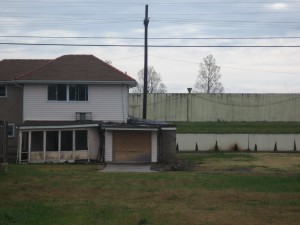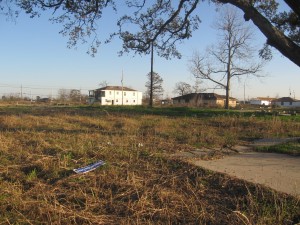By Bill Pitkin, Poverty and Inequality I spent a couple days in New Orleans recently learning about the recovery effort from Katrina. It was, in a word, stunning. I was stunned by the endurance of the devastation more than three years since the storms, as well as by the resilience and passion with which residents are rebuilding their great city. Katrina ended and destroyed thousands of lives and ruined thousands of homes and businesses. Moreover, it generated a national dialogue on poverty and race, the ugly issues we don’t like to discuss in polite company. I remember hearing from friends in developing countries who saw the coverage of Katrina in 2005 that they were shocked to see that such poverty existed in the U.S. Yes it did exist and let me tell you that it still does.

We toured several of the most affected neighborhoods, such as Gentilly, Lakeview, and the Lower Ninth Ward, where we saw just islands of homes in a sea of vacant lots and abandoned buildings. There is a lack of street life in these formerly dense neighborhoods, with buildings waiting for repair or demolition and a general sense of trepidation in the air. Looking even closer, there is despair. We entered abandoned buildings – old homes, vacant public school buildings, even a city-owned property – with homeless outreach workers and saw evidence of people sleeping in dark, smelly, rubble-filled spaces that barely offer a roof over their heads. In one room in a large public building, one person had set up a mattress (hauled up three flights of stairs) with a few worldly possessions, including a metal bar next to the mattress that we could only guess was for personal defense. We met and spoke to elderly disabled people living in the most precarious conditions, happy to have someone showing interest in them, but hoping for a more permanent solution.
Katrina has obviously exacerbated long-standing poverty and housing challenges in the city. According to the latest
New Orleans Index, there are about 65,000 abandoned or blighted properties in New Orleans, fair market rents have increased by nearly 50%, and almost 14,000 people in the region are at risk of a severe housing crisis when their Disaster Housing Assistance Program vouchers are set to expire in March 2009. Perhaps most telling is that the homeless population in New Orleans has doubled from about 6,000 to 12,000 since Katrina (while the overall population is at just 70% of that before the storm).
Despite these challenges, there is evidence of hope. I asked Albert Ruesga, who recently moved to New Orleans to serve as CEO of the
Greater New Orleans Foundation, about the most surprising thing about the city that he has noticed, and he pointed to the deep pride and sense of place that residents have. Coming from California , where everybody is originally from somewhere else, I was surprised to learn that the vast majority of New Orleans residents were born in Louisiana. We witnessed this local pride in the form of renovated homes by property owners fortunate to have insurance or other means to rebuild and beautify their homes (Mardi Gras was coming up, after all). Civic, philanthropic and nonprofit leaders are coordinating to make key investments in building affordable housing and a viable community development system. We saw first hand the smart, compassionate work of outreach workers from
UNITY of Greater New Orleans, which is leading the charge to move chronically homeless people from the streets or abandoned buildings to permanent supportive housing. Public sector funds have unfortunately been slow to get on the ground; but

at least the city government is beginning to think more holistically about their work and interface with private and nonprofit efforts.
The problems facing New Orleans are great, but from the short time I was there, I saw evidence that its people are stepping up to the challenge. But, they need our help. In a future post, I will highlight some ideas on what you can do to help in the recovery effort in New Orleans.
Read "Report from New Orleans, Part II: What you can do to help" at the Poverty and Inequality BlogLearn more about Funders Together's tour at the 2009 Grantmakers in Health Annual Conference on "Systems Change and Supportive Housing in New Orleans"
 A couple of weeks ago the head of one of the nation's leading funders reiterated it's long-held belief that housing is at the heart of nearly every key social issue funders face - an opinion we very much share at Funders Together. Here in it's entirety is the commentary from Jonathan Fanton, president of the John D. and Catherine T. MacArthur Foundation (you can also read it on the MacArthur site).
A couple of weeks ago the head of one of the nation's leading funders reiterated it's long-held belief that housing is at the heart of nearly every key social issue funders face - an opinion we very much share at Funders Together. Here in it's entirety is the commentary from Jonathan Fanton, president of the John D. and Catherine T. MacArthur Foundation (you can also read it on the MacArthur site).


